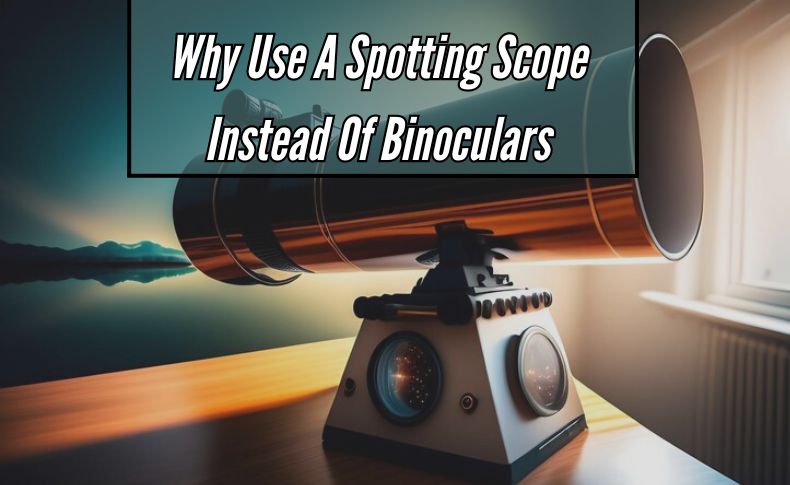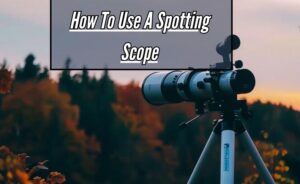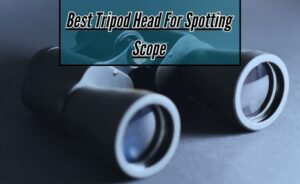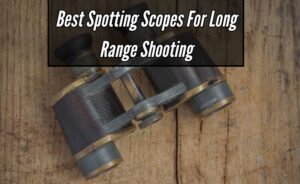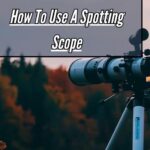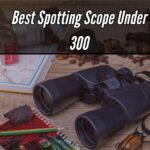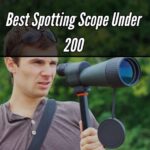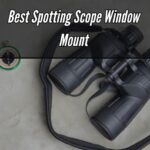Choosing between binoculars and a spotting scope can be very important when it comes to taking in outdoor activities such as birdwatching or nature observation. Both have their own benefits even though they fulfill comparable functions. Unlike binoculars, spotting scopes have a higher magnification, which makes it possible to view details and things farther away. They are therefore perfect for pursuits like long-distance birdwatching, hunting, and astronomy.
Why Use A Spotting Scope Instead Of Binoculars? When it comes to thorough observation of distant objects, a spotting scope is the best option due to its higher magnification and image quality when compared to binoculars. For pursuits like astronomy, hunting, and birding, its increased strength allows for precision targeting. Furthermore, replaceable eyepieces and tripod compatibility are common features of spotting scopes, which improve stability and adaptability in a variety of settings.
Furthermore, larger objective lenses—which capture more light and produce brighter images, particularly in low light—are a common feature of spotting scopes. They also provide stability for extended viewing sessions because of their robust construction and tripod compatibility. You can improve your outdoor experience and get closer to the beauties of the surrounding environment by realizing the advantages of a spotting scope over binoculars.
Spotting Scope vs. Binoculars: Choosing the Right Tool for Your Observation Needs
Selecting between binoculars and spotting scopes can be difficult. While binoculars are more versatile, spotting scopes offer high magnification for up-close looks. Together, we can select the ideal observational aid for your requirements.
Spotting Scope:
For some tasks, binoculars are not as advantageous as spotting scopes. With their increased magnification, these scopes—basically, telescopes made for terrestrial viewing—are appropriate for long-range observation.
With their larger objective lenses, they are excellent at capturing light, which produces photographs that are sharper and more vibrant, particularly in low light. Spotting telescopes are especially popular among wildlife watchers, amateur astronomers, and birdwatchers because they can produce clear, detailed views of far-off objects.
Binoculars:
Outdoor enthusiasts often use binoculars, which are multipurpose optical tools with two telescopes set side by side. Binoculars have a larger field of vision than spotting scopes, which makes up for their lower magnification.
This makes it easier for users to track rapidly moving objects and cover large regions. They are the perfect companions for a variety of activities, including hiking, concerts, sporting events, and casual wildlife viewing because of their lightweight and portable design.
Distance Observation:
Long-range observation is one of the main uses of a spotting scope as opposed to binoculars. Higher magnification capabilities offered by spotting telescopes enable users to precisely zoom in on far-off subjects.
This makes them important for activities like observing birds, wildlife, and even astronomical objects from a distance where minute details must be noted. Binoculars, while useful for closer observation, may not offer the necessary magnification for such tasks.
Detail and Clarity:
Spotting scopes are well known for their superb detail and image quality. Even in difficult lighting circumstances, they produce sharp and clear images thanks to their larger objective lenses and higher magnification.
This degree of specificity is especially necessary for pursuits where deciphering minute details is essential, such as observing wildlife and birds. Even while they have a respectable quality of image, binoculars could not be as clear and detailed as spotting scopes, especially when used at greater distances.
Stability and Tripod Use:
In order to see steadily with a spotting scope, especially at higher magnifications, a tripod is frequently needed. Even though it sounds laborious, technique guarantees steady images—especially when watching far-off topics for extended periods of time.
In contrast, binoculars are usually used handheld and provide more versatility and convenience in a range of circumstances. However, for prolonged observation or when using higher amplification binoculars, stability can be compromised without the aid of a tripod.
Specialized Viewing:
For certain viewing requirements, a spotting scope should be chosen above binoculars. Target shooters, amateur astronomers, and nature photographers frequently utilize spotting scopes because of their excellent image quality and great magnification.
For those who are interested in these subjects, they are essential instruments since they offer detailed views of far-off targets, wildlife, and celestial objects. Although they are quite useful, binoculars might not provide the same level of accuracy and detail needed for these kinds of specialized viewing activities.
Spotting Scope vs. Binoculars: The Ultimate Guide for Outdoor Enthusiasts
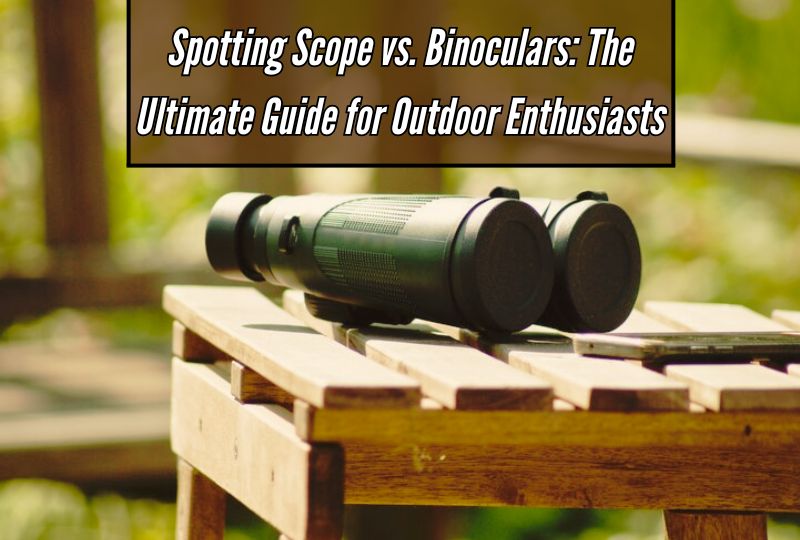
Selecting between binoculars and a spotting scope might significantly alter your outdoor experience when it comes to improving it. Making an informed decision requires an understanding of their distinctions as they serve different functions and accommodate diverse activities.
Target Shooting:
A spotting scope is frequently the recommended option for target shooting due to its precision and accuracy. Shooters can see targets clearly from a distance because to its increased magnification and larger objective lens diameter, which helps with accurate aim and shot placement.
While helpful for surveying the area, binoculars could not provide the same level of detail required for target shooting.
Hunting:
Both binoculars and spotting scopes have advantages in the field of hunting. Spotting scopes are excellent for long-range observation because they enable hunters to clearly identify game and examine far-off terrain. However, because of their portability and versatility, binoculars are the best tool for quickly scanning a region and following up on moving targets up close.
Wildlife & Astronomy Viewing:
The decision between spotting scopes and binoculars for animal observation or night sky exploration boils down to personal taste and requirements.
Because spotting scopes have a larger magnification, they are appropriate for closely examining wildlife and studying the stars. On the other hand, binoculars have a larger field of vision, which makes them great for scanning large areas of sky or terrain.
Spectator Sports Viewing:
You may improve your viewing experience with the correct optics whether you’re at a football game or a bird watching event.
For sports fans who want to get a closer look at the action or a closer look at faraway players or birds, spotting scopes are perfect. Because of their larger field of vision, binoculars are a superior option for monitoring the entire field or flock and tracking swift movements.
Choosing the Right Optics:
The choice between binoculars and a spotting scope ultimately comes down to your personal requirements and tastes. When making your decision, take into account aspects like budget, portability, field of view, and magnification.
If you value clarity and detail at a distance, a spotting scope would be a better choice. Binoculars, however, can be the better option if you value portability and simplicity of usage more than anything else. Whichever option you select, spending money on high-quality optics will surely improve your outdoor experiences and make them more enjoyable overall.
Deciding Between Binoculars and Spotting Scopes: Your Outdoor Optics Companion
Selecting between binoculars and spotting scopes is an important decision when it comes to equipping yourself with the proper equipment for outdoor exploration. Making the most of your outdoor experiences requires a grasp of their distinctions, as each has special qualities and uses.
Optimal Usage Environments:
Think about the main areas in which you plan to use your optics. When rapid scanning and tracking are required in dynamic environments like forests or broad fields, binoculars perform exceptionally well.
Due to their larger magnification, spotting scopes are more appropriate for long-distance or stationary viewing, such as watching birds from a fixed point or studying landscapes from a distance.
Adaptability to Activities:
Consider the precise activities you plan to partake in. Because of their portability and simplicity of use, binoculars make excellent companions for a variety of activities, including hiking, seeing animals, and attending sporting events.
Although they are less portable, spotting scopes are excellent for tasks requiring close examination, such as target shooting, astronomy, and bird watching from a fixed location.
Ergonomics and Handling:
Selecting between binoculars and spotting scopes requires consideration of comfort and handling ease. Binoculars are more convenient for prolonged use without strain because they are usually lighter and more compact.
Even though they are larger, spotting scopes are more stable when used with tripods and may have better ergonomics for extended periods of fixed observation.
Depth of Field and Focus:
Analyze the way each lens manages focus and depth of field. When scanning landscapes or tracking moving targets, binoculars provide a larger depth of field that makes it possible to simultaneously focus on close and far objects.
Due to their limited depth of field, spotting scopes are excellent in precisely focusing and isolating far-off objects, making them perfect for close-up observation or photography.
Optic Essentials: Binoculars vs. Spotting Scopes for Every Adventure
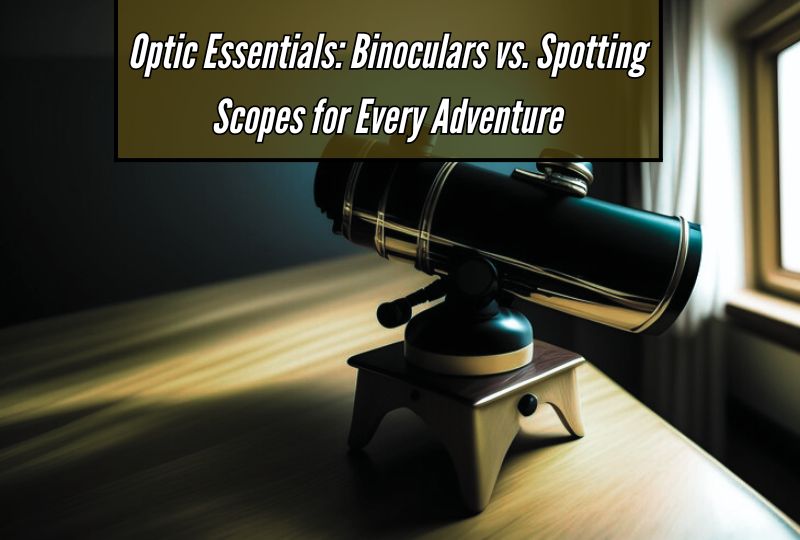
The correct optical gear can make all the difference when it comes to outdoor experiences. Choosing between binoculars and spotting scopes can be an important decision, whether you’re birdwatching, hunting, or just taking in the beautiful scenery.
Each is suited to specific requirements and tastes, and each has a unique combination of benefits and drawbacks. Let’s examine the fundamentals of each to assist you in selecting the right option for your upcoming journey.
Understanding Binoculars: Versatility in Compact Form
For outdoor enthusiasts, binoculars are indispensable because of their portability and user-friendliness. Their vast field of vision allows for the observation of landscapes, wildlife, and even astronomical bodies. They are available in several sizes and magnifications.
Binoculars, which come with two eyepieces, offer a three-dimensional perspective that improves depth awareness, which makes them perfect for sports, hiking, and bird watching. Their small size makes transporting them easy; they slip into pockets or backpacks with ease for usage when traveling.
Spotting Scopes: Precision and Long-range Observation
On the other hand, spotting scopes are preferred because of their great optical performance and high magnification, which make them essential for long-range observation. Spotting scopes are made of larger objective lenses and a single eyepiece, which allows them to capture distant details with remarkable brightness and clarity.
For long-distance precision observation, these are preferred by hunters, birdwatchers, and nature photographers. While spotting scopes are bigger than binoculars, they have unmatched amplification capabilities and frequently have adjustable eyepieces for greater versatility.
Choosing the Right Tool for the Job
When choosing between spotting scopes and binoculars, take your adventure’s particular needs into account. For general observation and activities where mobility is essential, like hiking or viewing wildlife in a variety of terrain, binoculars are perfect.
They are appropriate for both novices and casual outdoor enthusiasts due to their lightweight design and simplicity of use. On the other hand, a spotting scope can be a better option if your activities need precise observation and long-range clarity. The accuracy and magnification provided by spotting telescopes are useful for hunters tracking wildlife or birders recognizing distant species.
Accessory Options and Budget Considerations
To improve use and protection when purchasing optical equipment, consider adding extra accessories like lens coverings, carrying bags, and tripod adapters. While binoculars tend to be more budget-friendly, spotting scopes can range from affordable entry-level options to premium models with advanced features.
Zoom In: Unveiling the Advantages of Spotting Scopes Over Binoculars
In the world of outdoor observation and wildlife viewing, choosing the right optical equipment can make all the difference. While binoculars have long been the go-to choice for many enthusiasts, there’s a compelling case to be made for the often-overlooked spotting scopes.
Let’s delve into why spotting scopes offer unique advantages over binoculars, unlocking a whole new level of clarity and versatility in your outdoor pursuits.
Maximized Magnification: Unveiling the Superiority of Spotting Scopes for Detailed Observation
Spotting scopes offer unparalleled magnification capabilities, allowing for intricate details to be revealed with precision and clarity. Unlike binoculars, which may have limitations in amplification power, spotting telescopes excel in providing enhanced zoom capabilities, enabling users to zoom in closely on distant subjects for a closer look.
This enhanced magnification opens up a world of possibilities for nature enthusiasts, birdwatchers, hunters, and outdoor adventurers, allowing them to observe wildlife, landscapes, and celestial bodies with unparalleled clarity and detail. With spotting scopes, the ability to zoom in and uncover the hidden intricacies of the world around us is truly unparalleled, making them the preferred choice for those seeking to explore the great outdoors with unmatched precision and clarity.
Superior Image Quality and Brightness
One of the standout features of spotting scopes is their larger objective lenses, which gather more light and produce brighter, sharper images, especially in low-light conditions.
This enhanced light-gathering capability translates to clearer views and better contrast, allowing you to discern intricate details even in challenging environments like dawn or dusk.
Versatility in Optics and Accessories
Spotting scopes offer greater flexibility when it comes to optics and accessories. Unlike binoculars, which are limited to fixed magnification levels, spotting scopes often come with interchangeable eyepieces, allowing you to customize amplification to suit your needs. Additionally, spotting telescopes can be easily mounted on tripods, enabling steady, hands-free viewing for extended periods.
Compact and Portable Design
Despite their powerful capabilities, spotting scopes are often more compact and lightweight than binoculars of equivalent magnification.
This portability makes them an excellent choice for travelers, hikers, and outdoor adventurers who prioritize space-saving gear without compromising on performance. Whether you’re trekking through rugged terrain or embarking on a birding expedition, a spotting telescope is a valuable companion that won’t weigh you down.
Cost-Effective Long-term Investment
While spotting scopes may initially seem like a more significant investment compared to binoculars, their durability and versatility make them a cost-effective choice in the long run.
With proper care, a high-quality spotting scope can last a lifetime, providing countless hours of enjoyment and exploration across a wide range of activities. In comparison, binoculars may need to be replaced or upgraded more frequently, resulting in higher overall costs over time.
Immersive Viewing Experience
Finally, spotting scopes offer an immersive viewing experience that’s second to none. Whether you’re observing wildlife in its natural habitat, marveling at celestial wonders in the night sky, or surveying distant landscapes, the unparalleled clarity and magnification of a spotting scope transport you into the heart of the action, bringing the beauty of the world into sharp focus with every glance.
Scope it Out: The Compelling Case for Spotting Scopes Over Binoculars in Nature Observation

Nature observation enthusiasts are often faced with the choice between binoculars and spotting scopes. While both serve their purpose, spotting scopes offer a range of advantages that make them a superior choice in many scenarios. Let’s explore why opting for a spotting scope could elevate your nature observation experience.
Optical Precision:
Spotting scopes boast superior optical precision, allowing for crystal-clear views of distant subjects. This precision is particularly beneficial when observing small or elusive wildlife species, enabling enthusiasts to discern intricate details with ease.
The precise optics of spotting telescopes provide an immersive viewing experience that enhances appreciation for the natural world.
Adaptability in Terrain:
In diverse landscapes, adaptability is key. Spotting scopes offer versatility in terrain, allowing observers to seamlessly transition from open fields to densely forested areas without sacrificing clarity or field of view.
This adaptability ensures that nature enthusiasts can effectively observe wildlife in various habitats, from marshlands to mountain peaks, without limitations.
Extended Viewing Comfort:
Comfort during extended viewing sessions is paramount for nature enthusiasts. Spotting scopes, with their angled eyepieces and adjustable tripods, provide superior comfort compared to binoculars.
This ergonomic design reduces strain on the neck and back, allowing observers to indulge in uninterrupted nature observation for prolonged periods without discomfort.
Photographic Potential:
For those keen on capturing the beauty of nature through photography, spotting scopes offer significant advantages. Many spotting scopes are compatible with digiscoping adapters, enabling enthusiasts to attach cameras or smartphones for high-quality image and video capture. This photographic potential expands the scope of nature observation, transforming it into a creative endeavor.
Durability in the Field:
Nature can be unpredictable, with weather conditions ranging from scorching heat to torrential downpours.
Spotting scopes are built to withstand the rigors of outdoor exploration, featuring durable construction and weather-resistant coatings. This durability ensures that spotting telescopes remain reliable companions in the field, regardless of environmental challenges.
Sharper Focus: Why Opt for Spotting Scopes Instead of Binoculars
In the realm of outdoor observation, choosing the right optical tool can make all the difference. When it comes to enhancing your viewing experience, many enthusiasts deliberate between spotting scopes and binoculars.
Both offer unique benefits, yet spotting telescopes often stand out for specific applications. Here’s a closer look at why opting for spotting scopes might be the ideal choice for your outdoor pursuits:
Extended Viewing Sessions:
For prolonged observation sessions, the ergonomic design of spotting scopes offers superior comfort and stability. Unlike binoculars, which require users to hold them up for extended periods, spotting telescopes can be mounted on tripods, reducing arm fatigue and ensuring steady viewing. This stability is particularly beneficial for activities like stargazing or surveilling wildlife over long durations.
Adaptability to Various Conditions:
Spotting scopes are renowned for their versatility across different environmental conditions. With features like waterproof and fog-proof construction, they excel in adverse weather conditions, making them indispensable for outdoor enthusiasts. Whether rain or shine, spotting telescopes provide consistent performance, ensuring you never miss a moment of discovery.
Optimized for Digiscoping:
The compatibility of spotting scopes with digiscoping adapters allows users to capture stunning images and videos using smartphones or cameras.
This feature enables nature photographers and enthusiasts to document their observations effortlessly. With the ability to attach various camera devices, spotting telescopes offer endless possibilities for capturing memorable moments in the great outdoors.
Ideal for Long-distance Observation:
When it comes to long-distance observation, spotting scopes outperform binoculars in terms of clarity and range. Whether surveying landscapes, observing celestial bodies, or spotting elusive wildlife, the powerful optics of spotting telescopes provide unparalleled amplification, allowing users to explore the distant reaches with unparalleled precision.
Compact and Portable Design:
Despite their powerful optics, spotting scopes often feature a compact and lightweight design, making them easy to transport and set up in the field.
Whether hiking through rugged terrain or traveling to remote locations, the portability of spotting scopes ensures that you can always have superior optics at your disposal, ready to enhance your outdoor adventures.
Spotting Scopes Unveiled: A Closer Look at Their Edge Over Binoculars

Spotting scopes, often overshadowed by their more popular counterpart, binoculars, hold a distinct advantage in certain situations that warrant a closer examination. Let’s delve into why spotting scopes can offer a unique edge over binoculars.
Longer Eye Relief:
Spotting scopes usually feature longer eye relief than binoculars, making them more comfortable for extended viewing sessions, especially for individuals who wear glasses. This extended eye relief reduces eye strain and allows users to maintain a relaxed viewing posture.
Versatility in Mounting Options:
Spotting scopes can be easily mounted on tripods or other support systems, providing stability and allowing for hands-free operation.
This feature is advantageous for activities like nature observation, photography, and target shooting, where steady viewing is essential for capturing precise images or tracking moving subjects.
Enhanced Light Gathering Capability:
Spotting scopes often have larger objective lenses compared to binoculars, resulting in superior light-gathering ability. This advantage enables users to observe subjects in low-light conditions or during dawn and dusk when visibility may be limited.
Target Acquisition and Observation:
Spotting scopes excel in target acquisition and observation, particularly in outdoor activities such as hunting, archery, and tactical surveillance. Their high magnification, combined with superior image quality, allows users to pinpoint targets accurately and assess details crucial for making informed decisions.
Adaptability to Digiscoping:
Spotting scopes can be easily paired with digital cameras or smartphones for digiscoping, a popular technique among wildlife photographers and outdoor enthusiasts. This adaptability enables users to capture high-quality images and videos of distant subjects, expanding the scope of their outdoor adventures.
Conclusion:
In conclusion, there are a number of distinct benefits to using a spotting scope instead of binoculars for different types of hobbies, such as stargazing, hunting, and birding. Longer range viewing is made more enjoyable by the scope’s increased magnification, which offers crisper, more detailed views. Brighter images are produced, particularly in low light thanks to its bigger objective lens, which lets in more light.
To further expand your observational options, a lot of spotting scopes include suitable attachments and replaceable eyepieces. Binoculars are useful, but for outdoor enthusiasts who want a closer, clearer look at nature and beyond, a spotting telescope provides unmatched magnification and clarity.
Frequently Asked Questions (Why Use A Spotting Scope Instead Of Binoculars)
Do you need a spotting scope or binoculars?
Depending on your particular demands, you can choose between binoculars and a spotting scope. A spotting scope is the best tool for close-up observations of far-off objects, such as during target practice or bird watching, because of its higher magnification.
On the other hand, binoculars are a lightweight and practical option if you desire versatility for a range of activities like hiking or sporting events. To pick the best choice, take into account your intended purpose and the amount of detail you require. Choose the one that best fits your lifestyle from these two tools; they both improve your watching experience.
Why should I choose a spotting scope over binoculars for bird watching?
When bird viewing, there are clear benefits to using a spotting scope rather than binoculars. Higher magnification offered by spotting telescopes makes it possible to watch birds up close, especially from a distance. More light is collected by the bigger objective lens, improving visibility in low light. Sturdy construction of the scope usually includes a tripod, which offers stability for extended viewing.
Spotting scopes are therefore perfect for stationary bird observation. Even if they are portable, binoculars might not have the steadiness and amplification required for close-up bird watching. In summary, a spotting telescope is an excellent option for your birding excursions if you value precise, stable long-range bird viewing.
Can a spotting scope replace binoculars for general use?
Yes, under some circumstances a spotting scope can take the role of binoculars for general use. While binoculars are useful for a wide range of activities, spotting scopes are best used for specialized tasks such as target shooting, bird watching, or monitoring far-off things. Because they have a larger magnification, spotting telescopes are perfect for observing details at a greater distance.
But keep in mind that they are less portable than binoculars, so think about the intended purpose. Binoculars are better if you need a large field of vision and portability. Nonetheless, a spotting scope is a wise investment if amplification and close observation are your top priorities. For the best viewing experience, choose your selections depending on your unique requirements.
Are spotting scopes better for stargazing than binoculars?
Yes, spotting scopes are usually a better option for stargazing than binoculars. Larger objective lenses on spotting scopes let in more light, producing sharper views of celestial objects. Additionally, they provide a larger magnification, which facilitates the observation of features in far-off stars, planets, and the moon.
Although portable and practical, binoculars may not be able to capture as much light or have as much amplification as they would like. Because of its superior light-gathering and magnification capabilities, a spotting scope is frequently recommended for the best stargazing experiences, particularly when observing dim celestial bodies.
Are spotting scopes more suitable for target shooting than binoculars?
Yes, spotting scopes work better than binoculars for target shooting in most situations. Higher magnification offered by spotting scopes enables shooters to closely view targets at longer ranges. Their larger objective lenses also collect more light, which improves the sharpness of the image under different lighting circumstances.
Furthermore, spotting telescopes frequently have features like tripod compatibility and angled eyepieces, which provide stability during extended use. Although binoculars can be used for a variety of general observation purposes, spotting telescopes are specifically designed to provide an enhanced and concentrated view of the target area, making them the perfect tool for precise target shooting.
Can a spotting scope be used for surveillance and security purposes?
Yes, you can use a spotting scope for security and surveillance. Spotting telescopes have strong magnification, allowing users to clearly see far-off areas. They are useful for keeping an eye on big outside areas, activities, or wildlife. It’s crucial to remember, though, that spotting scopes may not have capabilities unique to surveillance gear and are instead made largely for optical clarity.
Take into consideration specially designed surveillance instruments for specialized security requirements. When employing any equipment for security, make sure it complies with all applicable local rules and regulations.

